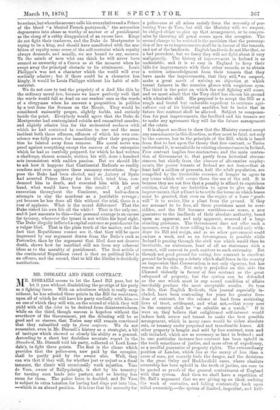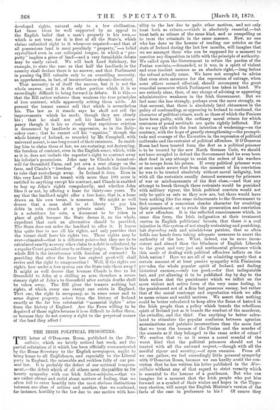MR. DISRAELI AND FREE CONTRACT.
MDISRAELImeans to .let the Land Bill pass, but to 1 let it pass without diminishing the prestige of his party as d fighting force. With an adroitness which is really mag- nificent, he has selected three points in the Bill for resistance, upon all of which he will have his party cordially with him,— on one of which they will win, on the second of which they will yield with all the eclat to be derived from disinterestedness, while on the third, though success is hopeless without the overthrow of the Government, yet the debating will be so good and so sincere, that Tories may still remain convinced that they submitted only to force majeure. We do not remember, even in Mr. Disraeli's history as a strategist, a bit of tactique which showed so clearly his ability as a general. According to a short but doubtless accurate report in the Standard, Mr. Disraeli told his party, collected at Lord Lons- dale's, to fight three points. The first is the clause which provides that the police-cess, now paid by the occupier, shall be partly paid by the owner also. Well, they can win that if they will, for whether just or unjust as a fiscal measure, the clause will occasionally work injustice. Vere de Vere, owner of Ballyquhaigh, is shot by his tenantry for turning corn lands into pasture, and so leaving less room for them. The police force is doubled, and De Vere is subject to extra taxation for having had slugs put into him, —which is an absurd position. It is true that the necessity for a police-cess at all arises mainly from the necessity of pro- tecting Vera de Vera, but still the Ministry will, we suspect, be obliged either to give up that arrangement, or to compro- mise by throwing all penal cesses upon the occupier. The second change to be resisted is the provision that the presump- tion of law as to improvements shall be in favour of the tenants, and not of the landlords. English landlords do not like that, as a bad precedent, but we fancy they will not fight about it very malignantly. The history of improvement in Ireland is so undeniable, and it is so easy in England to keep their bills for improvements with their other records, or to obtain a written acknowledgment from their tenants that they have made the improvements, that they will, 'we suspect, make a great merit of waiving an objection at which tenant farmers in the counties glance with suspicious eyes. The third is the point on which the real fighting will come, and we must admit that the Tory chief has chosen his ground with admirable skill. His proposal is to accept the Bill as a rough and brutal but endurable expedient to extricate agri- culture out of its historical muddles, but to insist that in future free contract shall be allowed. Subject to compensa- tion for past improvements, the landlord and his tenants are to make any agreement they will for the future management of the estate.
It is almost needless to show that the Ministry cannot accept any amendments in this direction, as they must be fatal, not only to the success, but to the principle of the Bill, which is based from first to last upon the theory that free contract, as Tories understand it, is unsuitable to existing circumstances in Ireland. Free contract implies free contractors, and the main conten- tion of Government is, that partly from historical circum- stances, but chiefly from the absence of alternative employ- ments, the poorer tenants of Ireland are not free,—that at least half a million of peasants, half the adult population, are compelled by the irresistible coercion of hunger to agree to any terms which will secure them the use of the soil. It is because they are not free that a penalty is affixed to capricious eviction, that they are forbidden to agree to give up their improvements, that a Court is to settle the terms on which leases must be granted, that even on the expiry of a lease " good- will " is to revive, like a plant from the ground. If they are assumed to be free, all these provisions must be over- ridden, and the Bill becomes worthless—or worse, a new guarantee to the landlords of their absolute authority, based upon an apparent, and only apparent, removal of a long- standing grievance. The Government dare not offer such a measure, even if it were willing to do so. It could only with- draw its Bill and resign, and as no other government could endure a week, and as no interregnum is possible while Ireland is passing through the civil war which would then be inevitable, no statesman, least of all no statesman with a coronet, will consent to push matters to such extremity. But though not good ground for voting, free contract is excellent ground for keeping up a debate which shall leave in the country an impression that Conservatism is not only vigorous, but has reason on its side. Not only is prejudice on this side the Channel violently in favour of free contract as the great safeguard of property, but the system can be defended as the one which must in any sound condition of affairs inevitably produce the most acceptable results. So true is this, that English Radicals, this journal especially in- cluded, have been contending for years for greater free- dom of contract, for the release of land from restricting laws of trust, settlement, and what not,—that every acre in the country shall be "as saleable as a watch." If it were so, they believe that enlightened self-interest would induce both owner and tenant to make the best possible arrangement, which in many cases would be either absolute sale, or tenancy under perpetual and transferable leases. All
other property is bought and sold by free contract, corn and salt included, which are as necessary as land in Ireland ; and in one particular instance free contract has been upheld in the teeth sometimes of justice, and more often of expediency, as a needful guarantee of property rights. The extraordinary position of London, which lies at the mercy of less than a score of men, yet scarcely feels the danger, and the decisions in the great Oxley and Huddersfield cases, where absolute ownership has been upheld in the teeth of justice, are sure to be quoted as proofs of the general contentment of England with that system. And then we shall have a repetition of Dr. Ball's argument that we are giving up an ideal, undoing the work of centuries, and falling contentedly back upon tribal ownership,—the system of limited, imperfect, and half- developed rights, natural only to a low civilization. Let those ideas be well supported by an appeal to
the English belief that a man's property is his own,—
which is not true, for it is first of all the State's, which claims unlimited right to it whenever required—and that of all possessions land is most peculiarly "property,"—a belief crystallized even in our colloquial tongue, in which a "pro- putty" implies a piece of land—and a very formidable debate
may be easily raised. We will back Lord Salisbury, for example, to state the case so that half the landlords in the country shall declare there is no answer, and that Parliament in passing thg Bill submits only to an overriding necessity, an apprehension, in fact, of insurrection or chronic discontent. .
That necessity is of itself the answer, but it is not the whole answer, and it is the other portion which it is so exceedingly difficult to bring forward in debate. It is this,— that the Bill rather enforces than weakens the true principles of free contract, while apparently setting them aside. At present the tenant cannot sell that which is nevertheless his. The law as it stands says he shall not sell the improvements which he made, though they are clearly his ; that he shall not sell his landlord his occu- pancy though it is his so clearly that capricious eviction is denounced by landlords as oppression, as in the Bally- oohey case ; that he cannot sell his "equities," though the whole history of Ireland, as recorded by Mr. Campbell, with universal assent, is one long record of their existence. In enabl- ing him to claim them at law, we are restoring, not destroying, the freedom of contract, even in the English sense, which, wide as it is, does not include the superior's right to contract away his inferior's possessions. John may be Claude's tenant-at- will for Greenfield Farm, and yet own a rent charge on the farm, and Claude's " freedom " does not include the freedom to take that rent-charge away. In Ireland it does. Even in this very Land Bill no tenant with more than 100 acres is entitled to anything except his contract, and Claude is enabled to buy up John's rights compulsorily, and whether John likes it or not, by offering a lease for thirty-one years. To say that the landlord might offer a free lease, that is, a lease drawn on his own terms, is nonsense. We might as well -decree that a man shall be at liberty to pay his
debts in coin struck at a private mint. The lease is a substitute for coin, a document to be taken in place of gold, because the State deems it, on the whole, expedient that such an alternative should be provided, The State does not order the landlord to offer it. It leaves him quite free to use all his rights, and only provides that the tenant shall have his rights too. Those rights may be over-estimated--that is a different point—but they are to be calculated exactly as every other claim to a debt is calculated, by a regular Court presided over by ordinary judges. Where in the whole Bill is the interference with freedom of contract ? In providing that after the lease has expired good-will shall revive and the right to compensation ? Well, if the rights are rights, how under a free system can the State take them away ? It might as well decree that because Claude is free to let 'Greenfield to John at a shilling an acre, therefore a rever- sionary right of John's to Greenfield after certain deaths shall be taken away. The Bill gives the tenants nothing but rights, of which every one except one exists in England. That one, the right to occupancy, as in some sense and to some degree property, arises from the history of Ireland exactly as the far less substantial "manorial rights" arise from the history of England. Are the Peers willing to be deprived of those rights because it is so difficult to define them, or because they do not convey a right to the perpetual usance of the land they affect ?









































 Previous page
Previous page